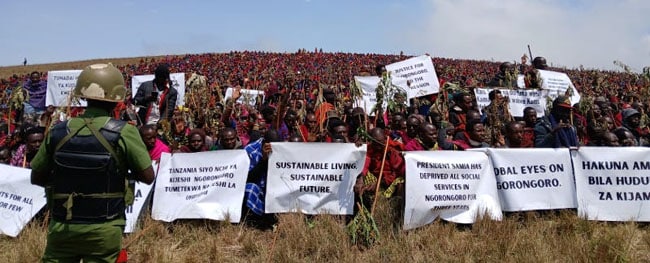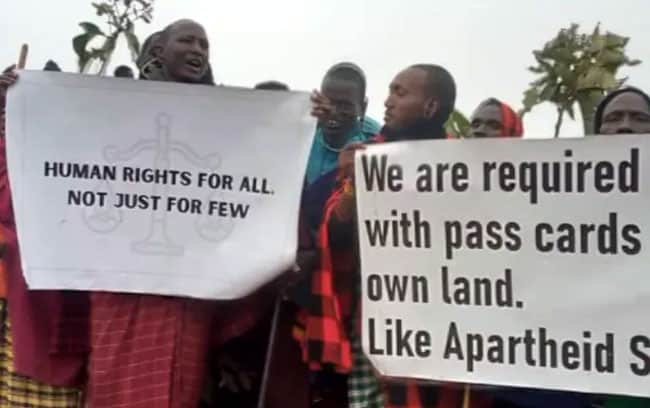
by Chris Lang
REDD Monitor, August 26, 2024
The Maasai Indigenous People living in the Ngorongoro Conservation Area in Tanzania are facing a new round of violence and eviction from their homes. In January 2024, the government announced that will change the legal status of the Ngorongoro Conservation Area to prevent human settlement inside the protected area. About 100,000 people, nearly all Maasai pastoralists, would be forcibly evicted as a result.
In August 2024, the government removed the Ngorongoro division from the voters’ register thus denying Maasai pastoralists their right to vote. Ezeiel Omelangi, a Maasai activist from Ngorongoro accused the government of deliberately denying essential services from the Maasai. Healthcare and education services as well as water supply have been cut, and now the right to vote has been removed.
“This is a clear violation of our right to vote,” Omelangi told Down to Earth. “Our way of life and our very freedom are under attack.”
Onesmo Olengurumwa is the National Coordinator of the Tanzania Human Rights Defenders Coalition. He told Down to Earth that nearly half the population of Ngorongoro has been left out of the voters’ register. “Denying these people the right to vote means the the entire district cannot choose leaders of their choice,” Olengurumwa said. “It is time to end this systemic discrimination against the Maasai people.”
‘Like Apartheid’
On 18 August 2024, thousands of Maasai blocked the road to the Ngorongoro Conservation Area in protest against the forced evictions and loss of basic rights. 16 people were arrested but subsequently released.
One of the banners held by the Maasai read, “We are required to move with pass cards in our own land. Like Apartheid SA.”
Joseph Oleshangay, a human rights lawyer, told Down to Earth: “It may not be white against black as in Apartheid South Africa. But we feel like we are living in a Bantustan. … It is just like South Africa now for the Maasai. Their healthcare has been cut. If they want to go to the nearest health centre in the surrounding districts, they must carry their pass. Else the authorities will never allow them back in.”
Maasai community members have accused park rangers and security forces of “intimidation and rights abuses, including killings, sexual assaults and livestock seizures,” Al Jazeera reports.
The protest was organized to raise awareness about the human rights abuses that the Maasai communities in Ngorongoro are facing, including the threat of eviction from their homes.
Yet in a bizarre statement issued on 18 August 2024, the Ngorongoro Conservation Area Authority states that, “The demonstrations, widely reported on social media platforms, should serve as clear evidence to the international community and the media that there are no human rights violations or mistreatment of residents with the NCA.”
The protests against conservation related human rights abuses in Tanzania are having some effect. In June 2024, the EU stopped funding for a conservation project in Tanzania. The US$20 million conservation project was initially meant for Tanzania and Kenya. Ana Pisonero Hernandez, an EU spokeswoman, told Al Jazeera that “the decision to amend the call was made to ensure the project’s objectives in terms of human rights protection and environmental concerns are achieved given recent tensions in the region.”
In 2023, the government of Tanzania denied three Members of European Parliament entry to the country who wanted to investigate the human rights abuses against the Maasai.
And in April 2024, the World Bank suspended funding for its Resilient Natural Resource Management for Tourism and Growth (REGROW). This US$150 million project is supposed to improve management of natural resources and tourism assets in Southern Tanzania, including the Ruaha National Park. But widespread human rights abuses were taking place against communities living near the park.
Two villagers, with support from the Oakland Institute, filed a complaint with the Bank’s Inspection Panel, which led to the suspension of funding.
Bishop Wofgang Pisa, the President of the Tanzania Episcopal Conference, urged the government “to respect the basis of good governance, transparency, truth, peace, and justice,” Vatican News reports. Bishop Pisa said,
“For what is happening in Ngorongoro, we ask the government ot return to the table and talk with the people of Ngorongoro, listen to them, and do not force them to relocate, or deny them essential social services, or block food from reaching them. Also, they should be given the right to vote where they currently reside. Today, you cannot tell the Tanzanian public that the Maasai are relocating voluntarily and then tomorrow we see Maasai on the streets crying and claiming their rights are being taken away.”
| The Maasai International Solidarity Alliance (MISA) released this statement 19 August 19.
SUPPORT THE NGORONGORO MOVEMENT The Maasai International Solidarity Alliance (MISA) stands in full solidarity with the Maasai of Ngorongoro who have bravely blocked the Ngorongoro-Serengeti road on Sunday 18 August 2024. Thousands of protesters demonstrated peacefully, sharing their plight with the world: “We are evicted so rich people change our homes into hotels”, “We are experiencing apartheid practices from Tanzanian government”, “It is sad to witness women suffering of oppression led by a woman President” or “Prisoners vote but Maasai of Ngorongoro not allowed to register as voters”. MISA is deeply impressed with the courage, determination and unity of the Ngorongoro Maasai, and fully supports their demands. It is high time their right to live and stay on the land is recognized, and their human rights as Tanzanian citizens are respected. MISA calls on the Tanzanian President to:
Recognizing the historical and shared responsibilities of the European Union and its Member States (including Germany), the United Kingdom and the United States in the current crisis, MISA calls on the international community to:
Noting that Ngorongoro was recognized as Natural World Heritage in 1979, Biosphere Reserve in 1981, Cultural World Heritage in 2010 and as Ngorongoro-Lengai Global Geopark in 2018, MISA calls on UNESCO, the World Heritage Committee (WHC) and advisory bodies ICOMOS and IUCN to:
——————– The Maasai International Solidarity Alliance (MISA) is an international alliance standing in solidarity with the Maasai of Northern Tanzania. We bring together international faith-based organizations, human rights organizations, international aid and development organizations, as well as grassroots organizations, individual activists, researchers and lawyers representing the Maasai in several land cases. Our alliance includes, among others, the Africa Europe Faith Justice Network (AEFJN), Agrecol Association for AgriCulture & Ecology, Coalition of European Lobbies for Eastern African Pastoralism (CELEP), CIDSE – International family of Catholic social justice organizations (International), Indigenous Movement for Peace Advancement and Conflict Transformation (IMPACT), FIAN International, FINAL GOVERNANCE, KOO – Koordinierungsstelle der Österreichischen Bischofskonferenz (Coordinating Office of the Austrian Bishops’ Conference), Gesellschaft für bedrohte Völker (Society for Threatened Peoples), Misereor, PINGO’s Forum (Pastoralists Indigenous Non-Governmental Organizations), PWC (Pastoral Women’s Council), TEST (Traditional Ecosystems Survival Tanzania), UCRT (Ujamaa Community Resource Team) and Welthaus Graz. Our main objective is to put an end to the human rights violations facing the Maasai of northern Tanzania. |




Leave a Comment